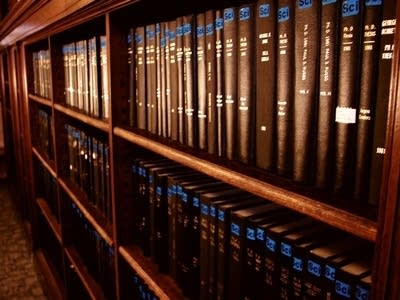U of M teams with Google to put books online

The university joins names like Oxford, Harvard, UCLA and the New York City Public Library as institutions that are handing their collections over to Google.

The company, known for its ubiquitous online search engine, scans the text of the collections and makes them available in the developing books search area of the Web site.
University librarian Wendy Lougee is convinced greater access to the books can only be a good thing.
"Materials that can be fully searchable in the text -- the use just goes up exponentially," said Lougee. "I was at the University of Michigan previously, and we had a project whereby books that hadn't circulated in several decades, once they were digitized, they were used a million times worldwide."
Create a More Connected Minnesota
MPR News is your trusted resource for the news you need. With your support, MPR News brings accessible, courageous journalism and authentic conversation to everyone - free of paywalls and barriers. Your gift makes a difference.
All the Big Ten schools and the University of Chicago are entering the Google agreement together. Google expects to digitize a total of up to 10 million books from all the institutions.
The University of Minnesota estimates one million of its six million materials will end up on Google's servers.

Those materials will most likely include the U's 250,000-book collection of Scandinavian publications, a renowned collection on forestry, and a store of beekeeping books started 80 years ago by faculty member and beekeeping pioneer Father Francis Jager.
Lougee says in addition to making the texts available to scholars worldwide, the Google effort is a boost for local students, who are from a generation more accustomed than their predecessors to digging online for sources.
"We have a lot of good experience that they do heavily use what's online," Lougee said, adding that online access is available 24 hours a day, seven days a week, "from their dorm room, from the grass outside using wireless technology. So it's clearly going to be significant part of their educational experience."
That said, Lougee doesn't believe library buildings loaded with paper books are becoming relics in the digital age. She draws her confidence from anecdotes she's heard that once people find a source online, their appetite is whetted to physically handle the real thing.
"This is massive copyright infringement. Google is ... exploiting the value of these books for commercial advantage. Plainly, it's not doing this as a charity."
This new agreement more than doubles the number of institutions providing library resources to Google. Provost Tom Sullivan says Google's involvement provides an opportunity the university could not individually afford.
"If we were to do this alone, by ourselves, the value for this project would cost the university somewhere around $60 million," said Sullivan.
As it is, the university is responsible merely for the staff time it takes to package and re-shelve books as they come and go from the place where Google does the work. Officials estimate that to be less than $150,000 a year.
Provost Sullivan says the university benefits by increasing access to its materials, preserving important texts, and expanding the institution's reputation.
"We are proud to be among the premier universities in the world to advance this new form of information and research for the public," Sullivan said.
With the momentum of a monolithic online company and several big educational names behind it, the Google Print project has little going against it -- except for the fact that it might be against the law.
"This is massive copyright infringement," said Paul Aiken, director of the Authors Guild, which has filed suit against Google over the scanning project. Several publishers are also suing Google.

"Google is ... exploiting the value of these books for commercial advantage. Plainly, it's not doing this as a charity," said Aiken. "The digital future should be for book authors too. It's not something for Google to determine or earn value from alone."
Nearly everything printed before 1923 is considered to be in the public domain. Most publications after that are protected by copyright. Google works around the copyright by providing only short excerpts of copyrighted works. The company claims it the use falls under fair use.
U of M Librarian Lougee says the university is aware of the copyright dispute, but is confident any legal recourse is with Google, not the participating universities.
"Copyright is certainly a dynamic concept these days, with a lot of interesting challenges. I think the kind of fair use that Google is making is innovative. But I think the institution stands by this decision."
Google has a six-year agreement. Officials believe they will finish what they need in that time.
